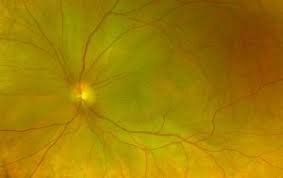Choroidal lymphoma, also referred to as intraocular lymphoma or primary vitreoretinal lymphoma, is a rare form of ocular cancer that predominantly affects the choroid, a layer of blood vessels located between the retina and the sclera at the back of the eye. This condition is characterized by the abnormal development of lymphoid cells within the eye, which are typically derived from lymphoid tissue outside the eye.
Choroidal lymphoma is categorized as an extranodal subtype of non-Hodgkin’s lymphoma. Choroidal lymphoma is regarded a primary central nervous system lymphoma due to its involvement with both the eye and the central nervous system.
Choroidal lymphoma can manifest a variety of clinical features, including:
Blurred Vision: Vision impairment is the most prevalent symptom of choroidal lymphoma, which is caused by the tumor’s location in the choroid, which disrupts the function of the adjacent retina.
Floaters: Floaters are small specks or filaments that appear to float in the patient’s field of vision. Floaters can be caused by lymphoma cells or detritus shed within the eye.
Eye Redness and Pain: Some people with choroidal lymphoma may experience eye redness, discomfort, or pain, especially if the tumor causes inflammation or raises intraocular pressure.
Choroidal lymphoma requires a thorough evaluation by an ophthalmologist or ocular oncologist in order to be diagnosed. Methods of diagnosis may include:
Ophthalmic Examination: A comprehensive examination of the eye, including measurement of visual acuity, assessment of intraocular pressure, and examination of the anterior and posterior segments, is performed to determine the presence of any anomalies.
Imaging Studies: Imaging techniques such as optical coherence tomography (OCT) and fluorescein angiography (FA) can provide specific information regarding the characteristics and extent of the choroidal lymphoma. In addition, magnetic resonance imaging (MRI) or computed tomography (CT) scans may be performed to evaluate central nervous system involvement.
Biopsy: In certain instances, a biopsy may be necessary to corroborate the diagnosis. This entails obtaining a tissue or fluid sample from the eye for examination under a microscope.
Cerebrospinal Fluid Analysis: A lumbar puncture may be performed to analyze the cerebrospinal fluid for the presence of lymphoma cells, as choroidal lymphoma is associated with involvement of the central nervous system.
Choroidal lymphoma is typically treated with a multidisciplinary approach that combines the skills of ophthalmologists, ocular oncologists, and hematologists/oncologists. Possible therapeutic options include:
Radiation Therapy: External beam radiation therapy directed at the afflicted eye is frequently the first-line treatment for choroidal lymphoma. This method seeks to eliminate cancer cells with minimal collateral damage to healthy tissue.
Systemic Chemotherapy: When there is involvement of the central nervous system or systemic spread, systemic chemotherapy may be recommended to manage the entire disease burden. Chemotherapeutic agents, such as methotrexate or rituximab, are frequently used to treat choroidal lymphoma.
Intravitreal Therapy: In some instances, intravitreal injections of chemotherapy agents, such as methotrexate or rituximab, may be used to directly target lymphoma cells within the eye.
Prognosis and Follow-up: The prognosis for choroidal lymphoma differs depending on factors such as the disease’s stage, the patient’s age, and the patient’s response to treatment. Detection and treatment at an early stage are crucial for attaining favorable outcomes. Regular follow-up visits and ophthalmic examinations are necessary for monitoring disease progression or recurrence.
Choroidal lymphoma is an uncommon form of ocular cancer that necessitates specialized evaluation and treatment. Vital for preserving visual function and preventing central nervous system involvement or systemic dissemination are prompt diagnosis and appropriate treatment. To optimize the management of patients with choroidal lymphoma, ophthalmologists, ocular oncologists, and hematologists/oncologists must work closely together. Ongoing research and advances in treatment modalities hold promise for further improving outcomes and prognosis for those afflicted by this uncommon ocular cancer.
If you need an appointment, please contact us at 03041119544 during our working hours or leave us a WhatsApp message at +923028291799 and someone will connect with you. Walk-in appointments are also available for emergencies. We can also be reached through our web portal on www.surgicaleyecenter.org


